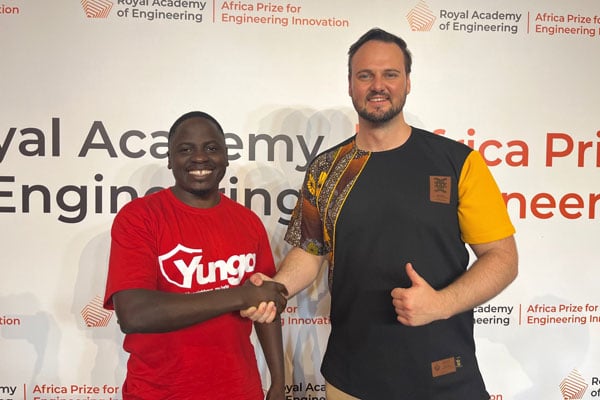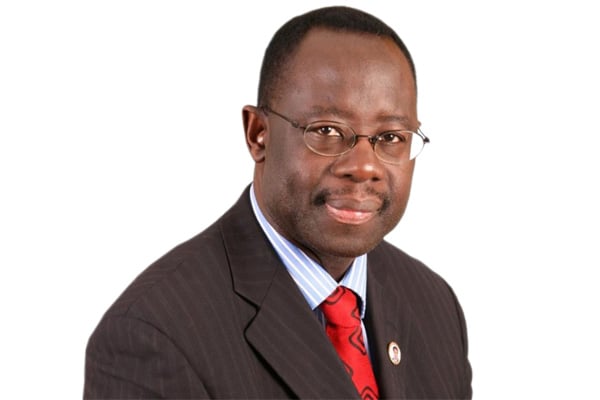Prime
Ugandan engineer, South African national share Shs92m innovations award

Ugandan Anatoli Kirigwajjo (L) and his co-winner of the 2023 Africa Prize for Engineering Innovation, South African Edmund Wessels (R). Photos/Chris Erasmus
What you need to know:
- Yunga is based on the African culture of sharing, based on trust, whereby communities are divided into networks of 10 to 30 households, with each receiving a device that is connected to a local network, with a similar device also given to local police stations.
Ugandan electrical engineer Anatoli Kirigwajjo has jointly won the 2023 Africa Prize for Engineering Innovation along with South African biomedical engineer Edmund Wessels – the first time the nine-year-old prestigious award has been shared.
Each of the two leading African innovators earned themselves not only kudos for their respective breakthroughs, but also an award of £25,000 (about Shs92 million).
Software engineer and entrepreneur, Mr Kirigwajjo won with his organisation Yunga, a local Ugandan digital security network that connects neighbours to each other and police, within a 20 km radius through a physical device, smartphone app or SMS service.
Using new technology to resolve old problems with communications, specifically in this case, thereby providing enhanced community security at low cost, was the key to his win, making him the second Ugandan to win this prize.
South African biomedical engineer Edmund Wessels was co-winner, along with his partners FlexiGyn, a battery-powered, portable handheld device that enables gynecologists to diagnose and treat a woman’s uterus without anesthetic or expensive equipment and in remote conditions.
It aims to increase women’s access to reproductive healthcare, particularly in remote areas.
Wessels is the second South African to win this prize.
The Africa Prize for Engineering Innovation, founded by the Royal Academy of Engineering in the UK, is Africa’s biggest prize dedicated to supporting and upscaling engineering innovation and, after nine years, has a proven track record of identifying successful engineering entrepreneurs.
Another African innovator, Nigerian Tolulope Olukokun, was winner of the Africa Prize’s One-to-Watch Award of £5,000.

Anatoli Kirigwajjo
The award recognises the potential of Olukokun’s innovation, an electric cargo bike with a battery-powered fridge, designed to help Nigeria’s smallholder farmers get fresh food crops to market.
Kirigwajjo came up with his idea after suffering a costly break-in.
His innovation is based on the ‘ten household model’, a traditional practice in Uganda, Kenya, Nigeria and Tanzania where people use drums to alert their community to an emergency.
Yunga is based on the African culture of sharing, based on trust, whereby communities are divided into networks of 10 to 30 households, with each receiving a device that is connected to a local network, with a similar device also given to local police stations.
In cases of attack or emergency, pressing a button sends a message to other devices and phones in the network with the victim’s details and address, prompting a community response. There is also a mobile app.

Edmund Wessels
The system also works in areas with no internet through a Long-Range Wide Area Network that has a 20km range.
The device can be connected to an online smart phone, or to a simpler phone using SMS and an ordinary GSM phone signal.
The system significantly reduces security response times, particularly in rural areas where police stations are distant.
In Uganda, 70 percent of burglaries occur when people are not at home, requiring the security package involved to have motion-sensors which alert the network when activated.
As a further innovation, Kirigwajjo and his team are incorporating artificial intelligence (AI) to detect behavioural patterns.
His AI-based device will learn when people are away, and activate itself if they forget to set their alarm.
In yet another forthcoming innovation, Kirigwajjo aims to integrate GPS, so that his system can detect when people leave home without turning on their security system.
About 2,500 people from 450 households in 18 communities across central Uganda are already on the Yunga network, with the organisation’s aim being to connect 32,000 households across Uganda in the next two years.
Kirigwajjo also wants to work with African governments to map crime hotspots, interpret the data through machine-learning, and advise on security resource allocation.




